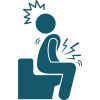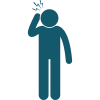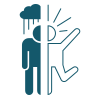What are the Perimenopause symptoms?
There are dozens of changes and symptoms associated with menopause found in five major categories:
- Vasomotor [Temperature]
- Urogenital [Vagina and Urinary Tract]
- Psychological [Mental Health]
- Body
- Head
Some of these are temporary whereas others can be permanent. Individual women often experience a range of symptoms from each category, varying from hot flashes and night sweats to anxiety and mood swings. Clinicians pair information about a woman’s symptoms with the date of the last menstrual period to determine whether a woman is likely to be in perimenopause, also known as the menopause transition.
Did you know?
If you’re one of the many women experiencing symptoms of menopause, you may be wondering what relief is available. While there is no cure for menopause, there are treatments that can help relieve your symptoms.
Though these symptoms can be uncomfortable, there are solutions available. Some women find relief with over-the-counter treatments like lubricants and moisturizers. Some may need to consult with their doctor to discuss hormone therapy. Others find relief with nutritional therapy, movement therapy and mind body wellness therapy.
Menopause is a natural biological process that marks the end of a woman’s reproductive years. While most women experience menopause in their early 50s, the symptoms can last for years. For some women, menopause is a time of great transition and they feel completely comfortable with the changes. Others find the symptoms to be disruptive and long-lasting. The good news is that there are treatments available to help manage menopause symptoms.
Symptoms associated with the transition into menopause become noticeable in your mid-40s. This is typical, but some women start to experience symptoms in their 30s, while other women start noticing them in their 50s.
The menopausal transition lasts, on average, for 7 years, but can last up to 14 years. Some women experience only one or two symptoms, while other women experience many. Not all symptoms happen at the same time, and not all symptoms will last for the entire time.
Menopause is different than perimenopause. When you have not had a period for one full year (12 months), you have officially entered menopause.
The stage just before menopause has several names – perimenopause, the menopausal transition, or simply ‘the change’. When it starts and how long it lasts vary from woman to woman. During this transitional stage, your hormones begin to fluctuate, sometimes wildly.
The most common symptoms of perimenopause are hot flashes & night sweats, anxiety, cognitive changes, metabolism & weight changes, mood changes & rage and insomnia & sleeping difficulties.
There are dozens of changes and symptoms associated with menopause found in five major categories:
- Vasomotor [Temperature]
- Urogenital [Vagina and Urinary Tract]
- Psychological [Mental Health]
- Somo-Vegetative [Body]
- Somo-Vegatative [Head]
Some of these are temporary whereas others can be permanent. Individual women often experience a range of symptoms from each category, varying from hot flashes and night sweats to anxiety and mood swings. Clinicians pair information about a woman’s symptoms with the date of the last menstrual period to determine whether a woman is likely to be in perimenopause, also known as the menopause transition.
YES
Yes, meditation and mindfulness are easy quick ways to inject calm and peace into your busy day. But getting long-term benefits that last beyond the immediate time you are meditating does require practice. Regular long-term practice will provide the best results, such as maintaining a calm and peaceful mind throughout the day regardless of external stressors. The word ‘practice’ is intentional – like any other skill, meditation and mindfulness require an investment of time to fully develop and benefit from them.
FALSE
No, there are many safe and effective non- prescription medications that can be used to lubricate your vagina. A vagina is a muscle, and it needs exercise.
Urine leakage can also be caused by damage done to the urethral sphincter during childbirth, as a complication of obesity and as a side-effect of urological surgeries such as a hysterectomy.
MYSTERY
Insomnia is a very common condition in modern life and is caused by environmental, social and biological factors. Research is actively trying to untangle the complex outcomes of these interactions.
FALSE
At first alcohol is relaxing, but it actually interferes with the brain and body’s ability to sleep deeply and for long periods.























